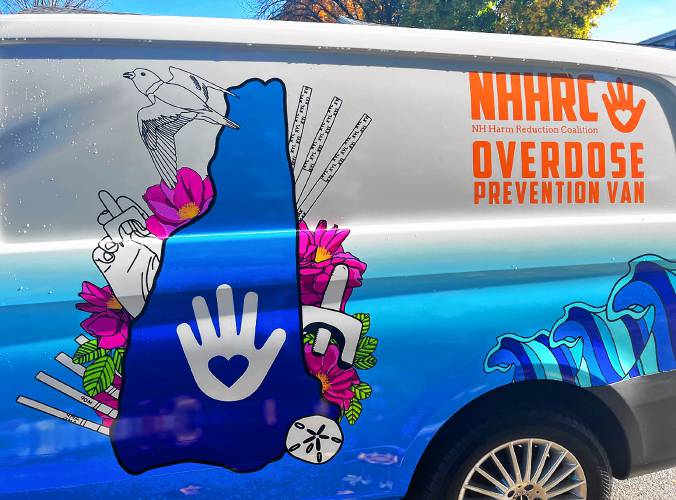New Hampshire adds second van to expand harm reduction efforts, overdose deaths decrease
|
Published: 03-02-2025 2:31 PM
Modified: 03-03-2025 2:49 PM |
A navy blue van has been making its way across New Hampshire for the past two years, stocked with naloxone, syringes, fentanyl test strips, condoms and other supplies meeting people where they are and helping to prevent overdoses and infections.
Now, it’s getting a partner — a second van, this time in a lighter shade of blue.
Run by the New Hampshire Harm Reduction Coalition (NHHRC), this mobile service is all about getting life-saving supplies directly into the hands of those who need them. And according to Executive Director Lauren McGinley, the demand has been clear from the start.
McGinley said the first van quickly revealed the overwhelming demand, and she knew the coalition would need another right away.
“We can only talk about transportation being an unmet need for so long before we just start providing that transportation or bringing the services directly to people,” said McGinley. “We have services in our state that meet needs. We sometimes lack services in our state that are able to meet barriers.”
With a second van on the road, NHHRC hopes to reach even more people, particularly in the North Country, where winter storms and road conditions can make access to care even harder.
The new van will provide supplies on the ground and deliver overdose prevention kits to community health centers that might otherwise struggle to get them.
Recent data from the New Hampshire Drug Monitoring Initiative shows some progress as overdose deaths dropped from 361 to 238 last year, with opioid-related deaths decreasing from 327 to 199.
Article continues after...
Yesterday's Most Read Articles
 Schools in Lakes Region explore creating a special education school to bring down costs
Schools in Lakes Region explore creating a special education school to bring down costs
 House committee defunds relief program for mothers and children, spares SNAP incentives
House committee defunds relief program for mothers and children, spares SNAP incentives
 ‘They deserve another chance too’: Palazzo Stables rescues four horses slated for kill farm
‘They deserve another chance too’: Palazzo Stables rescues four horses slated for kill farm
 12 Concord student-athletes sign on to play at the collegiate level
12 Concord student-athletes sign on to play at the collegiate level
 No bet limits and slot machines possible changes to New Hampshire’s casinos
No bet limits and slot machines possible changes to New Hampshire’s casinos
 Trump appoints former New Hampshire environment protection regulator as EPA head
Trump appoints former New Hampshire environment protection regulator as EPA head
The state’s Medical Examiner’s Office reports that people ages 30 to 39 had the highest percentage of overdose deaths at 31.1%, followed by those ages 40 to 49.
In Concord, there were 12 overdose deaths, Rochester had 11, Nashua saw 24 and Manchester reported 53.
But these numbers haven’t been finalized.
McGinley said that while she is glad to see overdose death rates decline, she remains concerned because these deaths were preventable.
“I will celebrate any decrease that we have, but I will cautiously tell people that we are not able to pinpoint exactly why,” said McGinley. “All I can say is we have an entire toolbox that we can utilize to prevent fatalities related to drug use and we need to make sure that that toolbox stays as current and as full of tools as possible and that we are using all of them.”
Opioid overdoses and deaths are rarely caused by just fentanyl. They are more often the result of a dangerous combination of drugs.
Data shows most overdose deaths in New Hampshire involve a combination of substances, including cocaine, methamphetamine, xylazine — a veterinary tranquilizer — and medications used to treat depression and anxiety.
In 2023, New Hampshire legalized the possession of fentanyl and xylazine test strips as lifesaving drug-checking equipment, but comprehensive drug-testing equipment is still not legal.
House Bill 226 aims to change that.
Advocates for these strategies argue that having the ability to check what’s in street drugs can help users understand what they’re taking and how much, giving them to take steps to reduce the risk of overdose.
“This bill would allow for organizations registered with the Department of Health and Human Services to use this equipment in order to gain more information about what is on our streets and with that help to target assistance where needed ultimately saving precious lives,” said State Rep. Jodi Newell at a hearing last month. Newell is a Keene Democrat and a prime sponsor of the legislation.
McGinley said that over the past ten years, conversations in New Hampshire about preventing overdoses and the spread of transmitted diseases – referred to as “harm reduction” – have evolved, and people have become more accepting of the approach.
“I can totally understand the goal of somebody that wants only abstinence or only sobriety,” said McGinley. “But the reality is we still have people dying at a high rate and so we have to release our grip on that hope for total abstinence or no drug and instead move to more realistic protections that we can help people implement in their own substance use.”
Sruthi Gopalakrishnan can be reached at sgopalakrishnan@cmonitor.com.









 Henniker ponders what is a ‘need’ and what is a ‘want’
Henniker ponders what is a ‘need’ and what is a ‘want’ Boscawen residents vote to fund major renovation of public works building
Boscawen residents vote to fund major renovation of public works building ‘Voting our wallets’: Loudon residents vote overwhelmingly against $1.7M bond for new fire truck
‘Voting our wallets’: Loudon residents vote overwhelmingly against $1.7M bond for new fire truck In Pembroke, Education Freedom Accounts draw debate, voters pass budget
In Pembroke, Education Freedom Accounts draw debate, voters pass budget
